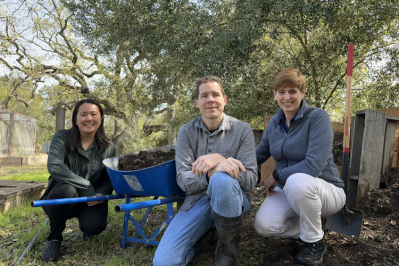Start-up behind methane-eating microbes technology raises $28m

Now, the start-up is looking to speed up its pilot deployments across methane-producing industries including agriculture, oil and gas, and waste management.
The company was founded by Josh Silverman, a scientist that holds a PhD in biochemistry and whose previous businesses across the therapeutics, data science and cell-ag space have attracted $300m in equity funding.
With Windfall Bio, the idea is simple yet novel – leverage naturally-occurring microbes to capture methane from the air to reduce its environmental impact and deposit nitrogen and carbon dioxide as a bi-product. The bacteria typically lives in the soil, feeding off methane as an energy source, but Silverman and his team previously told us they want ‘to take these organisms out of the soil and the apply them to areas they wouldn’t normally be exposed to – for example, the exhaust from a dairy barn’. The microbes are grown in fermentation vats, dried, and packed in a form similar to dried yeast, ready to be ‘activated’ in a favorable environment, such as a pile of compost which can be turned into nitrogen-rich fertilizer by the microbes.
Go deeper: Could methane-eating microbes solve dairy’s GHG emissions problem?
"We produce our proprietary mixture and use traditional fermentation equipment so we can develop commercial-scale batches," Silverman told us. "Methane has so much energy, so mems [short for methane-eating microbes, ed.] don't need much else."
Over the past year, Silverman and his team have continued to build out the company's resources and beef up manufacturing capacity. "Within the last year, we have built out our executive team and Board of Advisors," Silvreman explained. "Notably, the company appointed Frank Crespo, a co-founder of Windfall Bio, as chief operating officer, and Jordan Smith as vice-president of engineering.
"The Board consists of a group of individuals with a collective wealth of expertise and high status within their respective industries, including Steven Chu, former US Secretary of Energy. In total, we have nearly doubled in size, reaching about 30 employees, and are continuing to expand our team."
As for demand for the technology, Silverman said the startup is receiving demand from multiple industries, including agiculture, oil and gas, and waste management. "We are piloting with Whole Foods Market suppliers, specifically their dairy farmers, and look forward to sharing more later," he said. Other pilots being carried out, though it's too early to share results - but Silverman told us the trials are focused around specific engineering connections and on-site considerations in each specific industry, e.g. dairy versus landfill, rather than testing basic science parameters.
In this Series A funding round – which attracted $28m worth of venture capital including from Amazon’s Climate Pledge Fund, Global Brain, Untitled, Mayfield, Breakthrough Energy Ventures and B37 Ventures, the company has raked up $37m to date, inclusive of an earlier $9m seed raise.
So what’s next? "We are expanding pilot deployments across methane intensive industries including agriculture, oil and gas, and waste management and are investing resources to continue building out our team, manufacturing capacity and supply chain to meet growing global customer demand.
"Building out our manufacturing capacity is of top priority following the Series A raise," the Windfall Bio founder told us. "We have expanded our internal capacity by more than 10 times, including moving to a new facility and are actively working with several contract manufacturers to validate our production process within their facilities.
"Since we use contract manufacturing, we keep costs down and keep up with the necessary production as there's a huge fermentation capacity around the world, being able to drop into these operations allows us to scale rapidly.
"We'll be at commercial scale in 2025."








